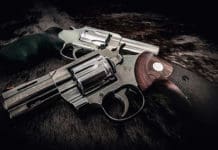The goal of most firearms trainers: turn you into them. If a trainer’s tactical dress, clipped tones and head-on-a-swivel stance makes you suspect that they’re ready, willing and able to do wet work in Mogadishu, they may not be the best option for self-defense instruction. As Clint Smith asserts above, not shooting is the armed Americans’ primary goal. If your trainer is all about the shooting, Houston, we have a problem. Saying that, I’m not that picky about my firearms training save the safety component. I take everything I learn with a grain of salt the size of the Hope Diamond. Besides, all that tacticool stuff is fun! So how do you choose training? Price, proximity, style, what? BTW: Did a SWAT team visit Thunder Ranch recently? There’s a motionless dog behind Clint . . .




Clint puts on some good training. I found that the “thinking” requirement was more important than the shooting skills. The improvement in shooting skills occurred naturally after the drills and technique taught became habit.
Well, I think he nailed it; logic. Is this training of value to me, does it address my more plausible type of encounter, does it address my weakest points? These are the questions I ask. Years ago I reached a point where the actual deployment of the weapon became automatic and virtually error free. Now I’m interested in training regarding novel use of cover, communication, movement and other sorts of things that improve my tactical advantage, not my shooting.
Curiously, I’ve never revived any training.
Oh, I’ve some education from a professional instructor — and I’m an engineer — so care, feeding and operation are covered.
I also practice, practice and practice, so I’m reasonably sharp, but as to tactical training, scenario-based preparation and so on, not so much.
Mayhap I should remedy this.
Highly recommend you see out professional training, you won’t regret it and I suspect you’ll be quite surprised by how much you didn’t know. I know I was.
Yeah, that’s where I was going.
The problem is always identifying what constitutes “good training”, even military training teaches “range-isms”.
I really look for training that is dynamic, and not range based. It’s also important for the scenarios to be realistic. You aren’t training for combat, you’re training for the guy who approaches saying, “Hey, bro, how do I find Main Street?”. Then transitions to, “Give me your f@$%Ing wallet!”
And don’t be anybody else. Rather than slavishly following one style, you need to absorb as much as possible and get rid of what doesn’t work for you.
In my opinion range training has only one purpose: familiarity with the weapons system. How to make it work, how to make it work AGAIN, and knowing the essentials of putting a round where you want it to go (most of the time). Once you’ve got that part down, do it again with a different weapon.
Past that point all training needs to be scenario based and LOGICAL for your experience level and actual potential needs. There’s no point learning to clear a house or even a room if you live alone. Hostage rescue? There’s lots of stuff professionals learn that most of us will never need and probably shouldn’t even know lest we are tempted to try it. (YMMV)
Thunder Ranch and many other schools put out pretty good videos ( I don’t always agree with Mr. Smith, but that’s just me) and the advice can be considered and/or trained in the comfort of your own home until you think you understand the concepts. Going live at some training facility may be fun, may be educational, but will DEFINATELY be expensive. Train accordingly.
Anyone else notice in the intro to the video that he had a weapon mounted light and was holding a light in his offhand as well with them both on? Someone explain that to me please.
I know, right? He SHOULD have just had two guns with lights…
Clint goes by the mantra, “One is none, two is one, three is better.”
I hope he’s not referring to testicles.
Much of the tactical firearms training out there isn’t firearms training. You see, regardless whatever specific good or service of whatever kind you ever buy, ultimately they all fall into one of two categories: 1.) Solutions to problems, and 2.) Good feelings. The second is actually a subset of the first, but it’s so important that warrants standing of its own.
If one were genuinely seeking to improve one’s firearms skills, in terms of safe and effective operation in various scenarios, then that’s one thing and good. Certainly there exist training venues to assist you in that goal. That’s a solution to a problem. However, that’s not what many of these tactical training classes are offering. Their actual product is simply good feelings, and no, there’s nothing inherently wrong with that, either.
Many of these classes are essentially about hanging out with some tough guys, bad asses from the sandbox or the SWAT team, cool kids with even cooler guns. It’s a chance to relive youth and climb macho mountain, without all that, you know, climbing and shit. ‘Cause, after all, Papa’s got the gout and a bad back. It’s largely good feelings escapism; just like baseball camps or race car camps or dude ranch vacations.
Now, I don’t challenge that you can pick up a tip or two that may well be useful in your plinking, competing, or possibly even in some home defending. Still, the idea that a weekend or week long firearms fantasy camp is going to make any discernible difference in anything, let alone transform you into Universal Soldier, is not only naive, but reckless. Focus on fundamentals and seek opportunities to improve upon them, but don’t confuse training with entertaining.
What formal training have you had, and from whom?
And that makes precisely what difference? On comment boards, as in the real world, anything you say can and will be used against you……..if it’s believed at all.
Let’s say I have all the most magnificent training and experience in the world and am fresh from the most dangerous missions in the most exotic locales. Then what? That suddenly makes my argument valid and acceptable? Hardly. Toward the opposite extreme, let’s say I’m just another Joe Nobody on the Internet who doesn’t know a muzzle from a hole in the ground. Then what? That suddenly makes my argument invalid and dismissible? Please.
Here’s a little lesson in logic: testimonials and ad hominems are fallacies. Either address the substance of my argument, or don’t, for all I care; but you don’t get to question me personally, as that’s irrelevant. No matter what credentials I present, you’ll say it’s not good enough or it’s not applicable or your experience differs so there’s no universal answer. And that futile exercise gets us where, exactly? Right back here where I’ve made my argument, while you’ve refused to address it and failed to refute it.
Your claim actually requires credentials. Not credentials that say you’ve been through dangerous missions in exotic locations. But credentials that say you’ve actually taken one or two of the tactical firearm classes you denigrate.
If you haven’t, it doesn’t matter how bad ass you are. You’re just making stuff up.
Soooo……..other than restating the first guy’s stance, you have nothing to refute anything I’ve said, either? Strong post. Thanks for stopping by.
Johnathan, it just seems to me that if you are going to assert opinions about the relative value of training, or lack thereof, it would be good for us to know precisely what training you have had which has led you to these conclusions.
As it stands, it appears you absolutely have no idea what you are talking about and are just spouting nonsense.
Paul, hush. I get your point and I’ve already addressed it. Yes, I have some experience with the type of training in question. Now what? Do you share with my opinion now? Are you convinced now that my opinion is backed by experience? Of course not. We’re right back where, as I predicted, you dismiss me because you don’t agree with me. You’ll keep pressing for more and more details, dates, and names, toward what purpose? It’ll never be enough for you to believe me, let alone to agree with me, and you know it. It’ll just fuel further bickering.
That you’re butt hurt because you’ve wasted umpteen thousands of dollars playing live action G.I. Joe is not my problem. My tangential involvement consists of simply having called it what it is. Once the apple of discord is out there and the egos are bruised, it’s silly to engage in a credentials pissing contest, because nobody’s ever going to concede the other guy’s point. After all, by your own admission, it’s just my opinion, anyway. So what does it matter, except you desperately trying to discredit me personally because you don’t share my personal opinion? The best you can hope for is to shift the discussion to me personally and refuse to address my point. Again. Still. Unfortunately, that’s not worth my attention, so this is where I hop off the merry-go-round. As always, you’re free to get in the last word/snipe and I won’t contest it. Good day, sir.
The criteria I use:
1) Performance-based subject matter expertise. Is the instructor demonstrably excellent at the topic he or she is teaching? Has that person met any relevant standards? “in the military” is different from “was on a team”. “Has shot IPSC” is different from “Grand Master”, and so on. Is that expertise relevant to the course topic? “Tactical” trainers that absolutely refuse to shoot competition are a no-go. In every case where I’ve gotten to see a Tactical Teddy on the range, it turns out that he’s not as good as your club-level Master class shooter — which is why he is so adamant about not competing.
2) Student accomplishments. Does the instructor have students who have performed well in real incidents? or have gone on to meet documentable performance levels? Do other instructors train with him/her? That tells me whether the instructor can teach.
3) Relevant of course content to real world needs. Courses that emphasize skills I might actually use, with the gear I am most likely to have with me, get priority.
4) Longevity. Given the choice between someone whose school opened last week and someone whose been teaching for 10 years, all credentials being equal, I’ll go with the old timer, because there are things you learn from experience teaching that you don’t learn by just being good at the skill itself.
The best instructors in the country aren’t the ones that spend their time making youtube videos, running forums, or debating with people online. Most of the real A-list guys and gals, not the Internet celebrities, stay booked months or years in advance, and have so much word of mouth business that they don’t need to invest in the sort of relentless self-promotion that’s made a few people “household names” in the blogosphere and forumsphere. There’s a 2nd tier of local schools, many of them run by solid, credible instructors, offering weekend training all over the US. Those schools rarely get the Internet attention they deserve, but they are the real backbone of the training industry.
And yet your username is also a link to… your firearms training business website. Hmmm…
Before I was an instructor I was a student. I take several classes a year from other instructors, and I host traveling instructors at my facility. Those are the criteria I use to choose who I train with. I also apply those standards to myself, my assistants, and my curriculum. Every instructor has strengths and weaknesses relative to that list, however I think it’s a good list that defines what a professional instructor should aspire to.
I took a class last weekend at Aysmmetric Solutions (Farmington, MO) thanks to a Living Social deal
Which class did you take from Asymmetric Solutions? Hope to see you out there sometime. Great group of folks: http://www.asymmetricsolutions.com
Tactical Pistol 1 or whatever it was called.
Good stuff, you taking any more?
As one of the people out there who thought I didn’t need any formal training and could pretty much teach myself how to use a firearm by spending time at the gun club punching holes in paper and watching YouTube videos, I can say without any doubt at all that I could not have been more wrong.
Now that I’ve taken quite a number of training classes in both pistol and carbine I realize how foolish my attitude was.
I’d say check out the background of the instructional staff wherever you go. Watch out for the guys who are training you based only on the fact they have taken a lot of training classes themselves [Yeager anyone?].
If you can find instructors who have actual, real-world experience using a firearm to defend their life and stop a threat, I’d say that would be a good start. They check out their class offerings. Try to find people who have taken training from them and listen to what they have to say about the classes.
+1. spent $1000 in ammo teaching myself a bad habit that was diagnosed and fixed in 2 hours and sub $200 by experienced instructor.
Precisely.
Amen. I’m planning to approach the guy that taught my CHL class and see if he does any rifle instruction when my .308 gets here. I’d rather not blow through god knows how much ammo, time and money getting decent at it. Even if it cost me 100-200 bucks for an hour or two of his time to teach me the basics of it, and help me get consistently on target, I’m OK with that.
Actually I may have him help me a bit with handguns too. Guy’s on furlough so he’s got time and probably needs $$$.
like the thought process and training to build flexible tactical mindset vs range drills. this takes more time but can cost less than lots of range time that might build bad habits like holstering gun or dropping to low ready before confirm bad guy stopped.
It’s simple. There’s only one training venue i know of that wouldn’t require an overnight trip.
Kind of depends on your goals doesn’t it? I mean, I’d love training on defensive handgun use but there’s not really a training center/site anywhere near here so its’ moot for me since I can’t take several days off for the class and travel time.
For basic stuff–helping me put bullets on target at the range, working on my basic rifle technique, I know a guy that did 12 years in the military that teaches some CHL courses. He was squad marksman so I imagine he knows how to use a rifle tooa nd I plan to approach him about teaching me to shoot one decently.
Before I got my NY pistol license, I trained at the Sig Academy in NH because it was the closest firearms school I had read about (in TTAG as it happens) where it was legal for me to handle, let alone shoot, a handgun. Not what you’d call an exacting standard but luckily the place turned out to be great. I’ve been back twice since I got my permit.
I like a school that has a formal curriculum, step-wise progression of classes, a rigorous but friendly atmosphere, and instructors who are strict about safety but have a bit of a sense of humor. From what I’ve read online and seen on You-Tube there are schools like that all over the country.
Comments are closed.